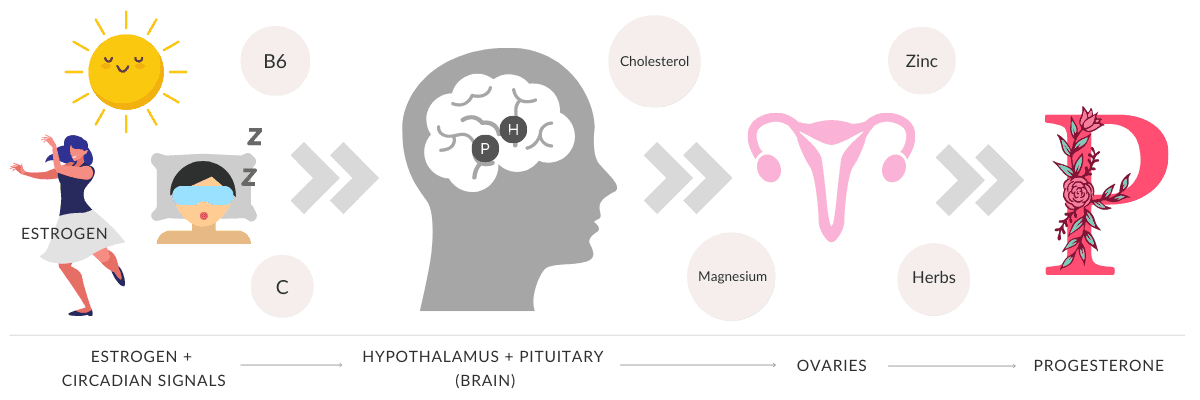Learn how this key hormone is made and 13 major benefits of progesterone for women’s health!
Progesterone is most known for its role in fertility, but it does so much more than that. Today, we’ll take a look at 13 major benefits for women’s health. But first, a quick intro to this beloved female hormone.
Meet Progesterone
WHERE IT’S MADE:
In the ovaries…but it doesn’t start there!
A mid-cycle estrogen surge teams up with our brain’s internal circadian clock (which depends on healthy light/dark and sleep/wake cycles!) to trigger the hypothalamus (in the brain) to release Gonadotropin Releasing Hormone (GnRH), which then triggers the pituitary (also in the brain) to release Luteinizing Hormone (LH), which tells the ovaries to release progesterone. (1, 5)
A variety of nutrients and herbs are helpful at various stages of this process, including B-6, Vitamin C, Cholesterol, Magnesium, Zinc, Chaste Tree/Vitex, Pine Bark, and more.
NORMAL PROGESTERONE FLUCTUATIONS:
Your progesterone levels fluctuate at certain times of the day, the month, and across your reproductive life. It’s especially important to keep these patterns in mind, especially when you’re testing progesterone levels at home or with a practitioner.
- Lifetime: Progesterone comes on the scene at puberty. Levels start to decline in our late 30’s, and continue to drop until we reach menopause
- Monthly: It peaks during luteal phase of our menstrual cycle (2nd half of your cycle, between ovulation and the start of your next menstrual bleed – see graph below)
- Daily: In the follicular phase (1st half) of your cycle, progesterone levels are more stable. But in the luteal phase (2nd half) of your cycle, levels fluctuate significantly throughout the day, usually highest in the morning (AM values are up to double PM values in some women!)
What Does Progesterone Do?
Below are some of the most important benefits of progesterone for women’s health.
1. Promotes Pregnancy + Prevents Miscarriage
Just a few days after implantation, progesterone ramps up to thicken the uterine lining. It’s turns a house into a home, so to speak, keeping the embryo nice and cozy during pregnancy. Progesterone also helps direct the immune system to protect this new growth as a friend, rather than attack it like a foe. (2)
2. Sheds the uterine lining if pregnancy doesn’t occur
If pregnancy doesn’t happen, progesterone drops, and prostaglandins and cytokines are released, signaling the body to shed the uterine lining it built to house a baby. This shedding is your period bleed. (7)
3. Sets the stage for Breastfeeding
During late pregnancy, progesterone increases the size of the breast alveoli and lobes, the little sacks where breastmilk is made and stored. After delivery, progesterone levels drop, which is part of the signal to the breasts to release milk for baby. (7)
4. Reduces anxiety
Progesterone increases brain levels of GABA, our calming neurotransmitter, giving it potent anti-anxiety effects. Interestingly, women are more prone to develop schizophrenia postpartum and post menopause, both stages with significant drops in progesterone (and estrogen). Preliminary studies have even shown a spike in progesterone during early stage schizophrenia, which is believed to be the body’s effort to prevent psychosis. (6)
5. Improves sleep (for some)
Insomnia is often blamed on low progesterone, and we do see many women enjoy better sleep when they take bioidentical progesterone. Research clearly supports this link in postmenopausal women, but results are mixed in premenopausal women. According to one meta-analysis, high progesterone is linked to poorer sleep in some studies of premenopausal women, whereas others show higher progesterone levels raise GABA and improve sleep quality. Of note, multiple studies have shown women get the best sleep when estrogen is highest and the worst sleep when it’s lowest. (12, 13)
The bottom line? More research is needed, but good sleep may be more about a proper balance of estrogen and progesterone than to certain levels of either one of them.
6. Decreases inflammation
Progesterone has anti-inflammatory effects in conditions like endometriosis, traumatic brain injury, pregnancy, cancer, and autoimmunity. (3, 10)
7. Lowers cancer risk
Premenopausal breast cancer rates are higher when progesterone is low. Furthermore, a meta-analysis of over 86,000 participants showed that natural (bioidentical) progesterone use in postmenopausal women significantly reduced breast cancer risk compared to synthetic progestins (which increase breast cancer risk). (4)
Progesterone replacement has also been linked to lower rates of uterine and colon cancers, but more study is needed to find out whether it protects against other types of cancer.
8. Reduces osteoporosis risk
History of anovulation (which equates to lower progesterone) has been linked to faster rates of bone loss. In postmenopausal women, adding (synthetic) progestin to synthetic estrogen hormone replacement therapy significantly improves bone mineral density (BMD) measurements over estrogen alone. Studies also show significant improvements in BMD when synthetic progestins are added to synthetic estrogen + bisphosphonate therapy (Fosamax, Boniva, Reclast, etc.).
Since both synthetic estrogen and synthetic progestins increase risk for cancer and heart disease, bioidentical progesterone + estradiol would be a logical, lower risk approach to osteoporosis prevention. (8)
9. Protects the brain
Many areas of the brain have progesterone receptors, and both animal and human studies have shown progesterone to benefit conditions like Alzheimer’s, traumatic brain injury, stroke, and cognitive decline of aging. (9)
10. May help reduce autoimmune activity
Progesterone binds to various immune cells and help direct immune activity to protect the body. We see this in pregnancy, where progesterone plays a key role in preventing immune attack on the fetus. Preliminary studies suggest progesterone may play a similar protective role in Rheumatoid Arthritis, Lupus, and Multiple Sclerosis. (10)
More study is needed to better understand these connections, and confirm whether the benefits extend to all autoimmune diseases.
11. May help with Weight Loss
Very little study on the link between natural progesterone and weight loss has been done and questions have even been raised about progesterone driving insulin resistance (much of this study has used artificial progestins, not natural progesterone). Yet, at least one study showed combined estrogen + progesterone hormone replacement in postmenopausal women improved insulin resistance. Additionally, we know that progesterone helps counter the inflammation and insulin resistance of a high estrogen state, which points to its role in weight management, especially in women prone to estrogen excess. Again, estrogen and progesterone working together in proper balance is likely more important than high or low levels of either hormone. (14, 15)
12. May help repair Leaky Gut
A small study in pregnant women showed progesterone decreased occludin and Lipopolysaccharide (LPS), two markers of leaky gut. Larger studies should be done to confirm the findings, but this is a promising new area of research! (11)
13. May help with drug addiction
More research is needed, but some studies suggest progesterone reduces cocaine and amphetamine seeking behaviors in women. Studies on alcohol and other substances are less developed. (16)
Remember, Progestin is NOT Progesterone!
The benefits above refer almost exclusively to natural progesterone made by the body, or of bioidentical progesterone (P4) given as a medication. Unfortunately, artificial progesterone (progestin) in most birth control medications, synthetic hormone replacement, etc. does not have the same benefits, and even increases risks in many of these areas.
Disclaimer: Information on this site is intended only for informational purposes and is not a substitute for medical advice. Always consult with a trusted healthcare provider before implementing significant dietary change. Read additional disclaimer info here.
References:





